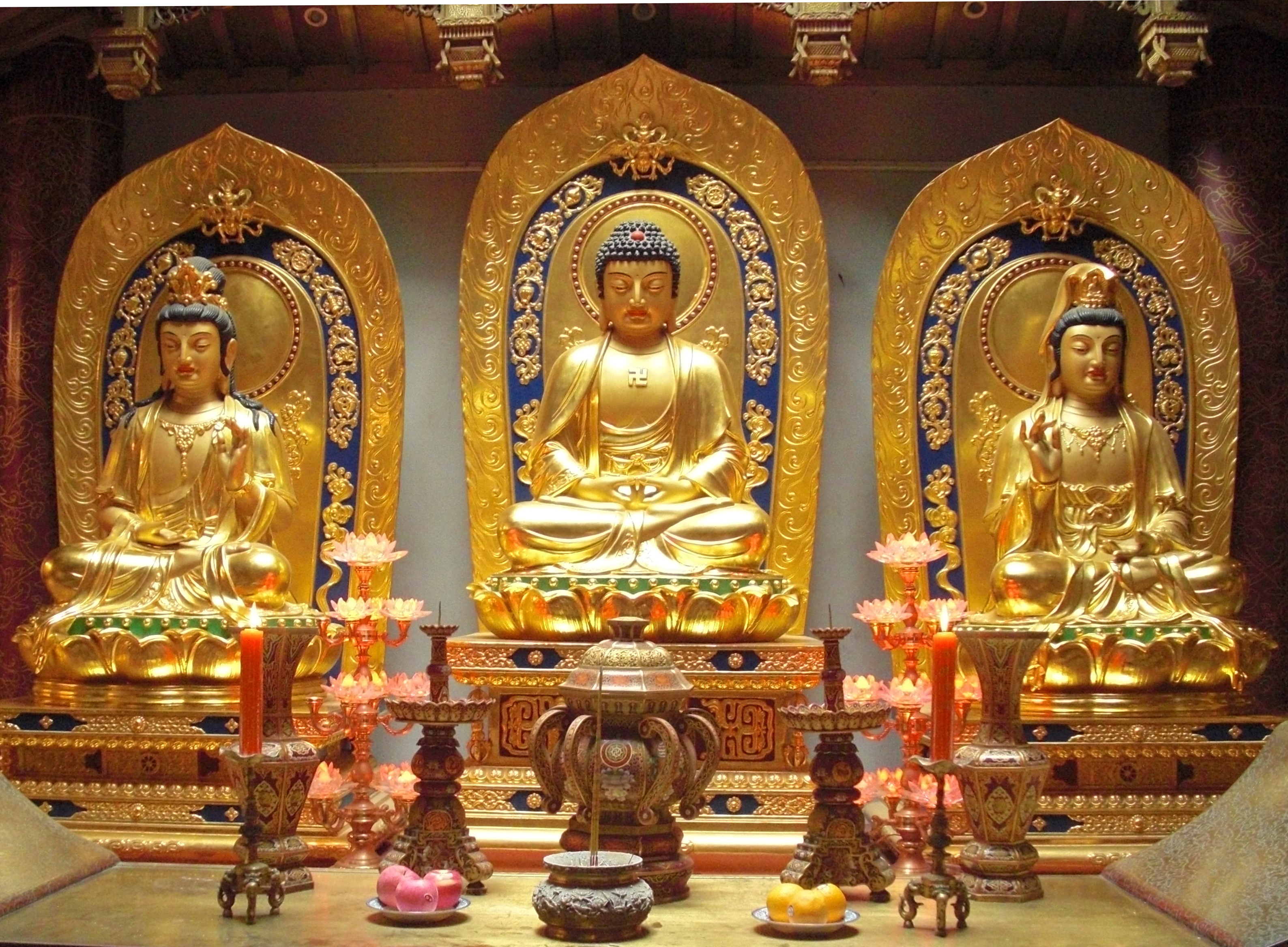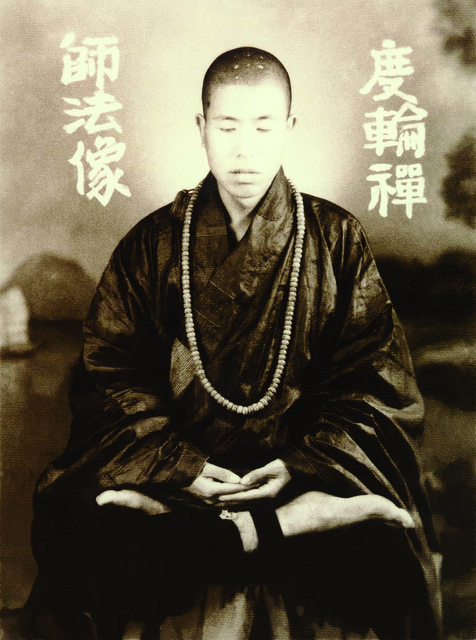|
Discourse On The Pure Land
The ''Discourse on the Pure Land'' (Ch: ''Jìngtǔ lùn'' 浄土論, Jp: ''Jōdō ron''; Sanskrit reconstruction: *''Sukhāvatīvyūhopadeśa;'' T. 1524) is an Indic Buddhist treatise on Pure Land Buddhist practice attributed to Vasubandhu.Payne, Richard K"The Five Contemplative Gates of Vasubandhu’s Rebirth Treatise as a Ritualized Visualization Practice" ''Pacific World'': Third Series Number 17 (2015) The full title of the work in Chinese translates to ''Verses of Aspiration: An Upadeśa on the Amitāyus Sūtra'' (Ch: ''Wúliángshòujīng yōupótíshè yuànshēng jié'' 無量壽經優婆提舍願生偈, T.1524). The ''Jìngtǔ lùn'' is said to have been translated into Chinese by the Indian monk Bodhiruci (6th century CE). It is one of the most important scriptures in Pure Land Buddhism alongside the three Pure Land sutras. The ''Discourse on the Pure Land'' is also the basis for an influential commentary by the Pure Land patriarch Tanluan, the ''Jingtu lun zhu'' ... [...More Info...] [...Related Items...] OR: [Wikipedia] [Google] [Baidu] |
Pure Land Buddhism
Pure Land Buddhism or the Pure Land School ( zh, c=淨土宗, p=Jìngtǔzōng) is a broad branch of Mahayana, Mahayana Buddhism focused on achieving rebirth in a Pure land, Pure Land. It is one of the most widely practiced traditions of East Asian Buddhism, Buddhism in East Asia. It is also known as the "Lotus School" (Chinese language, Chinese: 蓮宗; pinyin: ''Liánzōng'') in China or the "Nianfo, Nembutsu school" in Japan. East Asian Pure Land mainly relies on three main Mahayana sutras, Mahayana scriptures: the ''Longer Sukhāvatīvyūha Sūtra, Sutra of Amitayus'', the ''Amitāyus Contemplation Sūtra, Contemplation Sutra'' and the ''Shorter Sukhāvatīvyūha Sūtra, Amitabha Sutra''. The Pure Land tradition is primarily focused on achieving rebirth in a Buddhahood, Buddha's "pure land", a superior place to spiritually train for full Buddhahood, where one can meet a Buddha face to face and study under them without any of the distractions or fears of our world.Williams, Pau ... [...More Info...] [...Related Items...] OR: [Wikipedia] [Google] [Baidu] |
Dhyana In Buddhism
In the oldest texts of Buddhism, ''dhyāna'' () or ''jhāna'' () is a component of the training of the mind (''bhavana''), commonly translated as Buddhist meditation, meditation, to withdraw the mind from the automatic responses to sense-impressions and "burn up" the Kleshas (Buddhism), defilements, leading to a "state of perfect equanimity and awareness (''Upekṣā, upekkhā-Sati (Buddhism), sati-Purity in Buddhism, parisuddhi'')." ''Dhyāna'' may have been the core practice of pre-sectarian Buddhism, in combination with several related practices which together lead to perfected mindfulness and detachment. In the later commentarial tradition, which has survived in present-day Theravada, Theravāda, ''dhyāna'' is equated with "concentration", a state of one-pointed absorption in which there is a diminished awareness of the surroundings. In the contemporary Theravāda-based Vipassana movement, this absorbed state of mind is regarded as unnecessary and even non-beneficial for t ... [...More Info...] [...Related Items...] OR: [Wikipedia] [Google] [Baidu] |
Longer Sukhāvatīvyūha Sūtra
"Longer" is a song written and recorded by the American singer-songwriter Dan Fogelberg and released in 1979 by Full Moon Records and Epic Records. The song can be found on Fogelberg's 1979 album '' Phoenix''. It was also included on his 1982 greatest hits album as well as various other retrospective and compilation recordings. Fogelberg, who had released more rock oriented songs throughout the 1970s, jokingly described "Longer" in the liner notes to one of his retrospective albums as "the song that put me on the elevators."Hyatt, Wesley (1999). ''The Billboard Book of #1 Adult Contemporary Hits'' (Billboard Publications) He wrote the song while vacationing in Maui, "lounging in a hammock one night and looking up at the stars. It just seems this song was drifting around the universe, saw me, and decided I'd give it a good home." Accompanying Fogelberg's vocals is an acoustic guitar (played by the singer) as well as a flugelhorn solo by Jerry Hey. Lyrically, the song compares ... [...More Info...] [...Related Items...] OR: [Wikipedia] [Google] [Baidu] |
Primal Vow
In Pure Land Buddhism, the refers to a forty eight part vow that Amitābha Buddha made (long ago when he was a bodhisattva named Dharmakara). The term is often used to refer solely to the 18th part of the vow in particular (sometimes just called the 18th vow), which is very important for Pure Land Buddhist doctrine, especially in Japanese Buddhism. The term comes from the Sanskrit ''pūrva-praṇidhāna'', which means Past vow or Previous Vow. This term originally referred to any bodhisattva vows made by any bodhisattva in a past life, which retain a special spiritual power even after Buddhahood. Thus, the term can also refer to the past vows of other figures, such as is the twelve vows of Medicine Master Buddha. In Pure Land Buddhism however, the term specifically refers to the vow of Amitābha Buddha (Jp: Amida Butsu) found in the '' Infinite Life Sutra.'' The Japanese term ''Hongan'' is also the namesake of the Temple of the Original Vow ( Hongan-ji), a temple in Kyoto wh ... [...More Info...] [...Related Items...] OR: [Wikipedia] [Google] [Baidu] |
Bodhisattvas
In Buddhism, a bodhisattva is a person who has attained, or is striving towards, ''Enlightenment in Buddhism, bodhi'' ('awakening', 'enlightenment') or Buddhahood. Often, the term specifically refers to a person who forgoes or delays personal nirvana or ''bodhi'' in order to compassionately help other individuals reach Buddhahood. In the Early Buddhist schools, as well as modern Theravada, Theravāda Buddhism, bodhisattva (or bodhisatta) refers to someone who has made a resolution to become a Buddha (title), Buddha and has also received a confirmation or prediction from a living Buddha that this will come to pass. In Theravāda Buddhism, the bodhisattva is mainly seen as an exceptional and rare individual. Only a few select individuals are ultimately able to become bodhisattvas, such as Maitreya. In Mahayana, Mahāyāna Buddhism, a bodhisattva refers to anyone who has generated ''bodhicitta'', a spontaneous wish and compassionate mind to attain Buddhahood for the benefit of al ... [...More Info...] [...Related Items...] OR: [Wikipedia] [Google] [Baidu] |
Buddhahood
In Buddhism, Buddha (, which in classic Indo-Aryan languages, Indic languages means "awakened one") is a title for those who are Enlightenment in Buddhism, spiritually awake or enlightened, and have thus attained the Buddhist paths to liberation, supreme goal of Buddhism, variously described as Enlightenment in Buddhism, awakening or enlightenment (''bodhi''), ''Nirvana (Buddhism), Nirvāṇa'' ("blowing out"), and Moksha, liberation (''vimokṣa''). A Buddha is also someone who fully understands the ''Dharma, Dhārma'', the true nature of all things or Phenomenon, phenomena (''Abhidharma, dhārmata''), the Two truths doctrine, ultimate truth. Buddhahood (Sanskrit: ''buddhatva''; or ; zh, c=成佛) is the condition and state of being a Buddha. This highest spiritual state of being is also termed ''sammā-sambodhi'' (Sanskrit: ''samyaksaṃbodhi''; "full, complete awakening") and is interpreted in many different ways across schools of Buddhism. The title of "Buddha" is most c ... [...More Info...] [...Related Items...] OR: [Wikipedia] [Google] [Baidu] |
Dharmakāya
The ''dharmakāya'' (, "truth body" or "reality body", zh, t=法身, p=fǎshēn, ) is one of the three bodies (''trikāya'') of a Buddha in Mahāyāna Buddhism. The ''dharmakāya'' constitutes the unmanifested, "inconceivable" (''acintya'') aspect of a Buddha out of which Buddhas arise and to which they return after their dissolution. When a Buddha manifests out of the ''dharmakāya'' in a physical body of flesh and blood'','' which is perceptible to ordinary sentient beings, this is called a '' nirmāṇakāya'', "transformation body". The Dhammakāya tradition of Thailand and the '' Tathāgatagarbha sūtras'' of the ancient Indian tradition view the ''dharmakāya'' as the '' ātman'' (true self) of the Buddha present within all beings. Origins and development Pāli Canon In the Pāli Canon, Gautama Buddha tells Vasettha that the Tathāgata (the Buddha) is ''dhammakaya'', the "truth-body" or the "embodiment of truth", as well as ''dharmabhuta'', "truth-become", that ... [...More Info...] [...Related Items...] OR: [Wikipedia] [Google] [Baidu] |
Prajñā (Buddhism)
() or () is a Buddhist term often translated as "wisdom", "insight", "intelligence", or "understanding". It is described in Buddhist texts as the understanding of the true nature of phenomena. In the context of Buddhist meditation, it is the ability to understand the three characteristics of all things: ("impermanence"), ("dissatisfaction" or "suffering"), and ("non-self" or "egolessness"). Mahāyāna texts describe it as the understanding of ("emptiness"). It is part of the Threefold Training in Buddhism, and is one of the ten of Theravāda Buddhism and one of the six Mahāyāna . Etymology is often translated as "wisdom", but according to Buddhist bioethics scholar Damien Keown, it is closer in meaning to "insight", "non-discriminating knowledge", or "intuitive apprehension". The component parts of the word are: ; ''Pra'' () : an intensifier which can be translated as "higher", "greater", "supreme" or "premium", or "being born or springing up", referring to a spon ... [...More Info...] [...Related Items...] OR: [Wikipedia] [Google] [Baidu] |
Tathātā
Tathātā (; ; ) is a Buddhist term variously translated as "thusness" or "suchness", referring to the nature of reality free from conceptual elaborations and the subject–object distinction. Although it is a significant concept in Mahayana Buddhism, it is also used in the Theravada tradition. The Buddha The Buddha referred to himself as the Tathāgata, which can mean either "One who has thus come" or "One who has thus gone", and can also be interpreted as "One who has arrived at suchness". Theravada Buddhism In Theravada, this term designates the nature of existence (''bhāva''), the truth which applies to things. According to the '' Kathavatthu'', ''tathātā'' is not an unconditioned or un-constructed (''asankhata'') phenomenon. The only phenomenon which is un- constructed in Theravada is Nibbana. According to Buddhadasa Bhikkhu, ''tathātā'' is merely the way things are, the truth of all things: "When tathātā is seen, the three characteristics of anicca mpermanence ... [...More Info...] [...Related Items...] OR: [Wikipedia] [Google] [Baidu] |
Karma In Buddhism
Karma (Sanskrit: कर्म, Pāli: ''kamma'') is a Sanskrit term that literally means "action" or "doing". In the Buddhist tradition, ''karma'' refers to action driven by intention ('' cetanā'') which leads to future consequences. Those intentions are considered to be the determining factor in the kind of rebirth in '' samsara'', the cycle of rebirth. Etymology ''Karma'' (Sanskrit, also ''karman'', Pāli: ''kamma'', Tib. ''las'') is a Sanskrit term that literally means "action" or "doing". The word ''karma'' derives from the verbal root ''kṛ'', which means "do, make, perform, accomplish." ''Karmaphala'' (Tib. ''rgyu 'bras'') is the "fruit", "effect" or "result" of ''karma''. A similar term is ''karmavipaka'', the "maturation" or "cooking" of ''karma'': The metaphor is derived from agriculture: Buddhist understanding of ''karma'' ''Karma'' and ''karmaphala'' are fundamental concepts in Buddhism. The concepts of ''karma'' and ''karmaphala'' explain how intentional a ... [...More Info...] [...Related Items...] OR: [Wikipedia] [Google] [Baidu] |
Merit (Buddhism)
Merit (; ) is a concept considered fundamental to Buddhist ethics. It is a beneficial and protective force which accumulates as a result of good deeds, acts, or thoughts. Merit-making is important to Buddhist practice: merit brings good and agreeable results, determines the quality of the next life and contributes to a person's growth towards enlightenment. In addition, merit is also shared with a deceased loved one, in order to help the deceased in their new existence. Despite modernization, merit-making remains essential in traditional Buddhist countries and has had a significant impact on the rural economies in these countries. Merit is connected with the notions of purity and goodness. Before Buddhism, merit was used with regard to ancestor worship, but in Buddhism it gained a more general ethical meaning. Merit is a force that results from good deeds done; it is capable of attracting good circumstances in a person's life, as well as improving the person's mind and inne ... [...More Info...] [...Related Items...] OR: [Wikipedia] [Google] [Baidu] |






